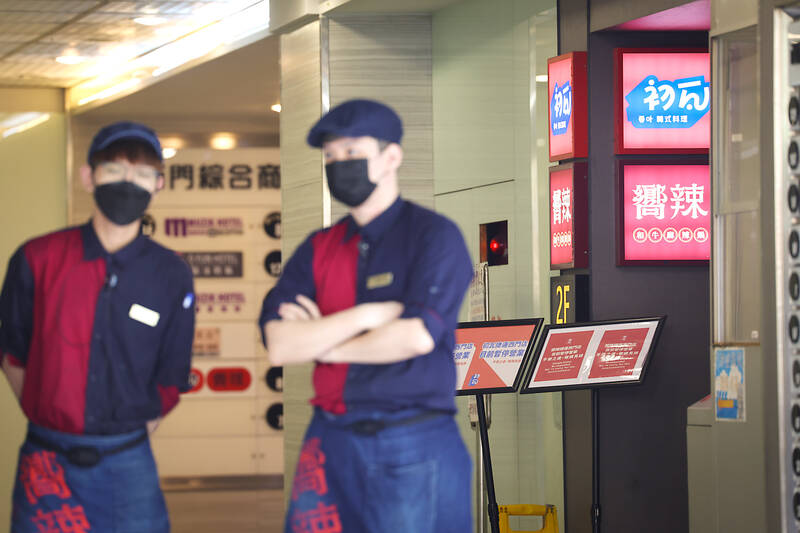Restaurant chain Wowprime Corp (王品) on Wednesday said that it would raise wages for its full-time employees by up to 7 percent starting from Jan. 1.
As for part-timers, Wowprime, which owns more than 30 brands in Taiwan and China with Wang Steak as its flagship brand, said hourly pay would be raised by 2 to 10 percent from next year.
After the pay hikes, the starting wage for Wowprime’s full-time employees would be NT$35,800 (US$1,096), while the hourly pay including incentives to encourage part-timers to be present in every scheduled time slot would be up to NT$220.

Photo: CNA
In addition, the maximum hourly night shift wage at Wowprime’s hotpot restaurants Chin Huajiao (青花轎), Xianla (嚮辣) and God Guo (尬鍋) would reach as high as NT$255, the chain said.
Wowprime cited a preliminary estimate as saying the pay raises are expected to increase its operating costs by about NT$100 million annually.
Despite the higher costs after the pay increases, Wowprime said it is planning to recruit 1,200 people next year with most of them to be allocated to its barbecue and hot pot brands.
Wowprime said chefs and managerial trainees in its five major hot pot restaurants are expected to have starting wages of NT$45,000 a month, and after seven months of training and completion of a performance evaluation, their wages could top NT$70,000.
Full-time employees would receive bonuses every year, while they would have three chances a year to get a pay raise, the company added.
The restaurant chain said it has teamed up with Swedish furniture brand IKEA to remodel three employee offices and dormitories in New Taipei City’s Sanchong District (三重) and Kaohsiung by the end of this year.
Next year, Wowprime would remodel an additional 20 dormitories, it said.
In the first three quarters of this year, Wowprime posted NT$12.41 in earnings per share, compared with NT$13.55 a year earlier.

The New Taiwan dollar is on the verge of overtaking the yuan as Asia’s best carry-trade target given its lower risk of interest-rate and currency volatility. A strategy of borrowing the New Taiwan dollar to invest in higher-yielding alternatives has generated the second-highest return over the past month among Asian currencies behind the yuan, based on the Sharpe ratio that measures risk-adjusted relative returns. The New Taiwan dollar may soon replace its Chinese peer as the region’s favored carry trade tool, analysts say, citing Beijing’s efforts to support the yuan that can create wild swings in borrowing costs. In contrast,

Nvidia Corp’s demand for advanced packaging from Taiwan Semiconductor Manufacturing Co (TSMC, 台積電) remains strong though the kind of technology it needs is changing, Nvidia CEO Jensen Huang (黃仁勳) said yesterday, after he was asked whether the company was cutting orders. Nvidia’s most advanced artificial intelligence (AI) chip, Blackwell, consists of multiple chips glued together using a complex chip-on-wafer-on-substrate (CoWoS) advanced packaging technology offered by TSMC, Nvidia’s main contract chipmaker. “As we move into Blackwell, we will use largely CoWoS-L. Of course, we’re still manufacturing Hopper, and Hopper will use CowoS-S. We will also transition the CoWoS-S capacity to CoWos-L,” Huang said

Nvidia Corp CEO Jensen Huang (黃仁勳) is expected to miss the inauguration of US president-elect Donald Trump on Monday, bucking a trend among high-profile US technology leaders. Huang is visiting East Asia this week, as he typically does around the time of the Lunar New Year, a person familiar with the situation said. He has never previously attended a US presidential inauguration, said the person, who asked not to be identified, because the plans have not been announced. That makes Nvidia an exception among the most valuable technology companies, most of which are sending cofounders or CEOs to the event. That includes

INDUSTRY LEADER: TSMC aims to continue outperforming the industry’s growth and makes 2025 another strong growth year, chairman and CEO C.C. Wei says Taiwan Semiconductor Manufacturing Co (TSMC, 台積電), a major chip supplier to Nvidia Corp and Apple Inc, yesterday said it aims to grow revenue by about 25 percent this year, driven by robust demand for artificial intelligence (AI) chips. That means TSMC would continue to outpace the foundry industry’s 10 percent annual growth this year based on the chipmaker’s estimate. The chipmaker expects revenue from AI-related chips to double this year, extending a three-fold increase last year. The growth would quicken over the next five years at a compound annual growth rate of 45 percent, fueled by strong demand for the high-performance computing